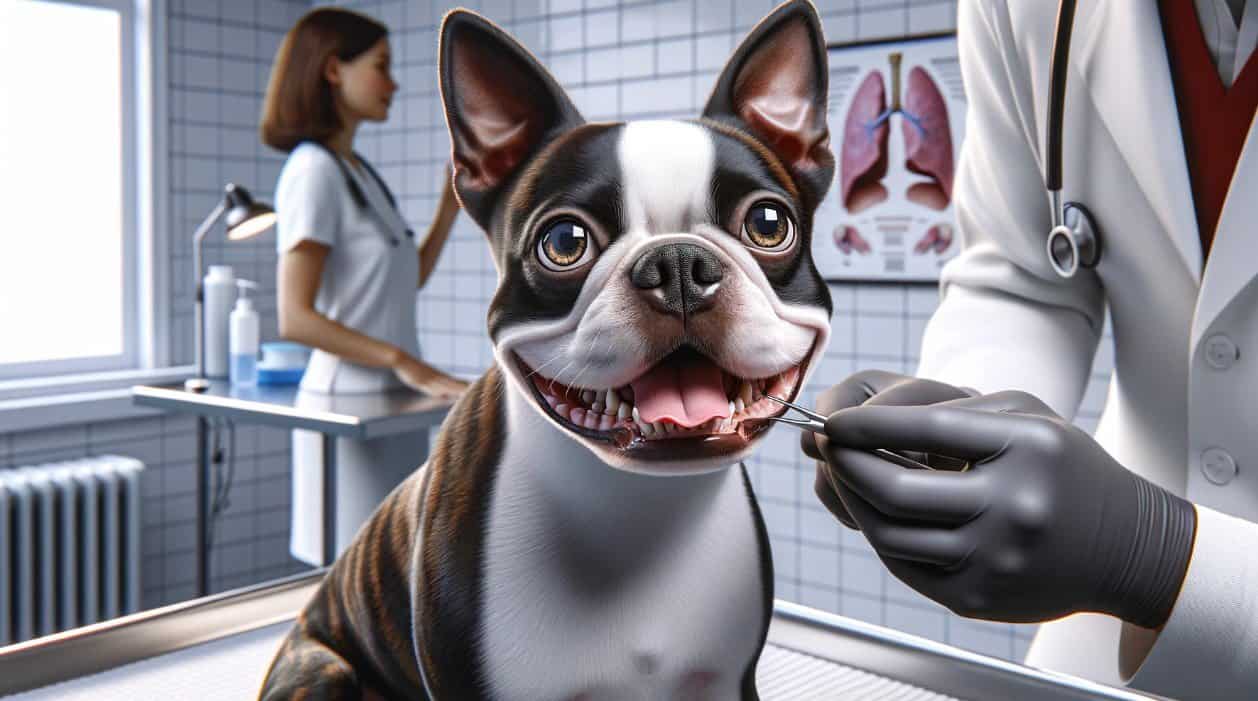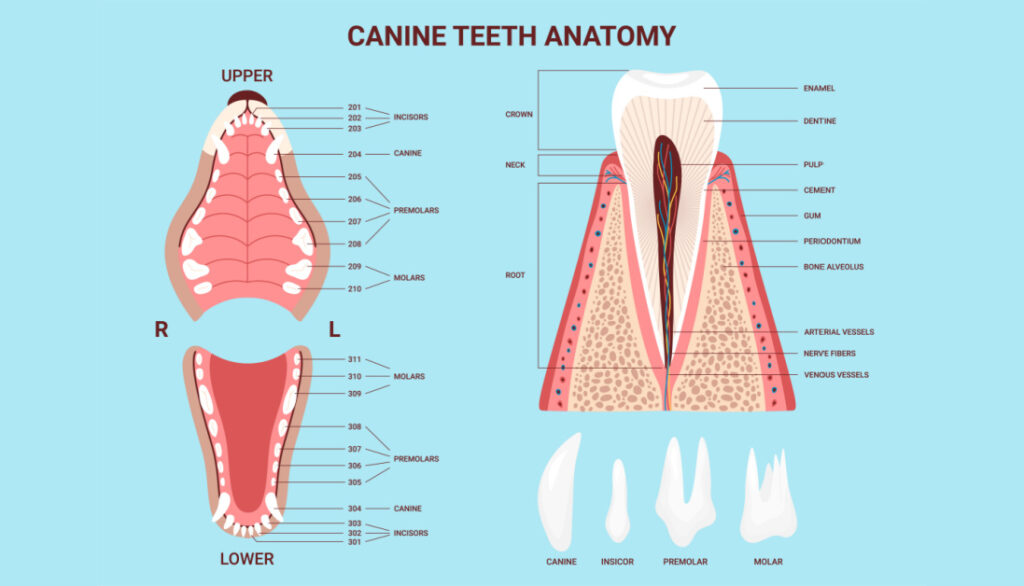Hello fellow pet parents! I’m Dr. Candy, your friendly holistic veterinarian. Today, we’re going to talk about an important topic that’s often overlooked – Boston Terrier Dental Health. Just like us, our furry friends can suffer from dental issues too. In fact, dental health is a crucial part of your Boston Terrier’s overall well-being.
Did you know that poor dental hygiene can lead to serious health problems such as heart disease and kidney disease in dogs? Yes, it’s that serious! So, let’s put a spotlight on our Boston Terrier’s pearly whites and learn how to keep them healthy and sparkling. We’ll discuss the signs of dental disease, common dental health issues specific to Boston Terriers, and both conventional and holistic treatment approaches.
Remember, your Boston Terrier’s sweet kisses should not be a stinky affair. So, let’s dive right in and learn how to combat bad breath and promote optimal dental hygiene for Boston Terriers. Your pup will thank you for it!

As a loving Boston Terrier parent, understanding the signs of dental disease in your fur baby is the first step towards ensuring their oral health. Let’s dive into the often overlooked world of Boston Terrier Dental Health.
Signs of Dental Disease in Boston Terriers
Like us, Boston Terriers are not immune to dental disease. They can experience a variety of oral health issues, many of which can be prevented with proper care and attention. So, what are the signs you should be on the lookout for?
- Bad breath: While a bit of doggy breath is normal, persistent bad breath can be a sign of underlying dental issues.
- Difficulty eating: If your Boston Terrier is having trouble eating or shows a decreased appetite, it could be due to dental pain.
- Changes in behavior: Any changes in your pet’s behavior, such as becoming more withdrawn or aggressive, can indicate discomfort or pain in their mouth.
- Bleeding or swelling in the mouth: This can indicate gum disease or other dental problems.
- Loose or missing teeth: If you notice any loose teeth or if your Boston Terrier is missing teeth, it’s time for a trip to the vet.
Remember, Boston Terriers are known for their stoic nature. They often hide their pain, so it’s crucial to regularly check their mouth and teeth for any signs of disease. Regular dental check-ups with your vet are also a must.
It’s also worth noting that Boston Terriers are brachycephalic dogs, meaning they have short noses and flat faces. This unique anatomy can make them more susceptible to dental issues. Their teeth are often crowded together, making them more prone to plaque buildup and periodontal disease.
Understanding these signs and acting quickly can make a significant difference in your Boston Terrier’s dental health. After all, prevention is always better than cure, especially when it comes to dental disease, which can lead to other serious health problems if left untreated. So, let’s commit to keeping those adorable Boston Terrier smiles healthy and bright!

Common Dental Health Issues In Boston Terriers
As a veterinarian, I’ve seen a range of Boston Terrier Dental Health issues. This breed is prone to certain oral health problems due to their unique brachycephalic (short-nosed) facial structure. Here are some of the most common issues:
- Periodontal Disease: This is a common issue in Boston Terriers. It starts with plaque buildup, which can harden into tartar if not removed. This can lead to gum inflammation (gingivitis) and eventually, periodontal disease.
- Tooth Decay and Loss: Boston Terriers are prone to tooth decay due to their compact teeth arrangement. If left untreated, this can lead to tooth loss.
- Halitosis (Bad Breath): Persistent bad breath in your Boston Terrier can be a sign of underlying dental problems such as periodontal disease or tooth decay.
- Oral Masses: Boston Terriers are prone to developing oral masses or tumors. Any unusual lumps in your dog’s mouth should be checked by a vet.
Understanding these common Boston Terrier Dental Health issues can help you spot early signs of trouble. Regular dental checkups and a good oral hygiene routine can go a long way in preventing these problems. Remember, your Boston Terrier’s dental health is an important part of their overall wellbeing.

Conventional Dental Health Treatments
When it comes to maintaining your Boston Terrier’s dental health, you’ll likely come across a variety of conventional treatments. The most common among these is anesthetic dental cleanings.
Anesthetic Dental Cleanings
Anesthetic dental cleanings are a comprehensive method of oral care that involves a deep clean of your Boston Terrier’s teeth, gums, and mouth. These cleanings are typically conducted by a veterinarian and involve the use of general anesthesia to ensure your pup’s comfort and safety.
The process involves scaling (removing tartar and plaque build-up), polishing, and a thorough examination of the mouth for any signs of dental disease. While this method is effective in maintaining your Boston Terrier’s oral health, it’s essential to note that it’s not without its risks, especially considering the breed’s potential health obstacles.
Potential Individual Health Obstacles
Certain health issues in Boston Terriers may complicate the use of general anesthesia. These include heart problems, drug sensitivities, seizures, and factors related to age.
Heart problems: Some Boston Terriers may have underlying heart conditions that can make anesthesia risky. Always ensure your pup has a thorough health check before undergoing any procedure that involves anesthesia.
Drug sensitivities: Boston Terriers can be sensitive to certain drugs used in anesthesia. It’s essential to discuss this with your vet and ensure any potential allergies or sensitivities are considered and addressed.
Seizures: If your Boston Terrier has a history of seizures, this could also complicate the use of anesthesia. Always inform your vet of your dog’s medical history before any procedure.
Extreme age: Older Boston Terriers may face increased risks with anesthesia. If your pup is advanced in age, discuss with your vet the potential risks and benefits of anesthetic dental cleanings.
While these obstacles may seem daunting, they shouldn’t deter you from prioritizing your Boston Terrier’s dental health. With careful planning, open communication with your vet, and an understanding of your pup’s individual health needs, maintaining your Boston Terrier’s dental health can be a manageable task. After all, a clean, healthy mouth is key to keeping your Boston Terrier happy and healthy.
Dr. Candy’s Holistic Approach To Oral & Dental Health
As a dog parent, you want the best for your Boston Terrier, and that includes their dental health. Dr. Candy, a renowned veterinarian, offers a holistic approach to maintaining your dog’s oral health. This involves a focus on diet and the use of specific probiotics.
Diet- Low Carbs, Avoid Added Sugars, Enzymes In Fresh Food
The first step towards achieving optimal dental health for your Boston Terrier is through their diet. A diet low in carbs and free from added sugars is crucial. Carbohydrates break down into sugars, which can lead to plaque build-up and tooth decay. Avoiding added sugars helps prevent these issues.
Next, focus on including fresh foods in their diet. Fresh fruits and vegetables, lean meats, and whole grains are packed full of enzymes that aid in the digestion process. These enzymes can also help keep your Boston Terrier’s teeth clean by breaking down food particles that could otherwise stick to their teeth and cause decay.
- Apples: They are rich in fiber and act as a natural toothbrush.
- Carrots: These are another high-fiber food that can help scrub your dog’s teeth clean.
- Lean meats: They provide essential proteins without adding unnecessary fats.
Oral Health Specific Probiotics
Along with a healthy diet, Dr. Candy also recommends incorporating oral health-specific probiotics into your Boston Terrier’s regimen. Probiotics are beneficial bacteria that can help maintain a healthy balance in your dog’s mouth. One such product is Probiora for Dogs, an oral health-targeted probiotic.
These probiotics help combat harmful bacteria that can lead to tooth decay and bad breath. They also promote a healthier oral environment, reducing the risk of gum disease and other dental health issues. Adding this to your Boston Terrier’s daily routine can significantly improve their oral health and overall well-being.
Remember, every Boston Terrier is unique, and what works for one may not work for all. Always consult with your vet before making any significant changes to your dog’s diet or introducing new supplements. With the right approach, you can ensure your Boston Terrier enjoys a lifetime of good dental health.

Recommended Dental Chews & Products For Boston Terriers
As a loving dog parent, you may have tried out various commercially promoted dental chews with hopes of improving your Boston Terrier’s dental health. However, you’ve probably found that these frequently advertised products don’t always live up to their promises. Not only do they often fail to effectively clean your fur baby’s teeth, but they can also be loaded with unhealthy additives and preservatives.
Additionally, some pet parents turn to drinking water additives as a quick fix for bad breath. While this might seem like an easy solution, these additives can actually disrupt your Boston Terrier’s gut health by killing off beneficial bacteria. This can lead to digestive problems and even more oral health issues down the line.
Dr. Candy’s Recommended Dental Chews & Products
When it comes to your Boston Terrier’s dental health, it’s essential to choose products that are not only effective but also healthy for your fur baby. Here are some of Dr. Candy’s top recommendations:
- Single Source Natural Proteins: Dental chews made from single source natural proteins like tendons are a great option. These chews are easily digestible and can help scrape off plaque and tartar from your Boston Terrier’s teeth as they chew.
- Raw Marrow Bones: Raw marrow bones are another excellent choice for promoting dental health. They provide a natural and effective way to clean your Boston Terrier’s teeth and gums. Always supervise your dog while they’re enjoying a marrow bone to ensure their safety.
- Bully Sticks: Bully sticks are not only a favorite treat among dogs, but they also work wonders in maintaining a healthy mouth. They’re durable and long-lasting, making them perfect for dogs who love to chew. Plus, they’re an excellent source of protein!
Remember, maintaining your Boston Terrier’s dental health is about more than just fresh breath. It’s about ensuring their overall health and happiness. By choosing the right dental chews and products, you’re taking a significant step toward giving your fur baby the healthy, happy life they deserve.
Frequently Asked Questions
1. What causes bad breath in Boston Terriers?
Bad breath in Boston Terriers can be caused by various factors such as poor dental hygiene, gum disease, tooth decay, or the presence of plaque and tartar.
2. How can I improve my Boston Terrier’s dental hygiene?
To improve your Boston Terrier’s dental hygiene, you can:
- Brush their teeth regularly using a dog-specific toothbrush and toothpaste.
- Provide dental chews or toys that help remove plaque and tartar.
- Feed them a balanced diet that promotes dental health.
- Schedule regular professional dental cleanings with a veterinarian.
3. Are there any home remedies for bad breath in Boston Terriers?
While it’s always best to consult with a veterinarian, you can try some home remedies to help with bad breath, such as:
- Adding a small amount of parsley to their food, as it may help freshen their breath.
- Using a water additive specifically designed to improve dental health.
- Offering raw carrots or apples as natural teeth-cleaning treats.
4. When should I seek professional help for my Boston Terrier’s bad breath?
If your Boston Terrier’s bad breath persists despite your efforts to improve their dental hygiene, it’s recommended to seek professional help from a veterinarian. They can examine your dog’s mouth, identify any underlying dental issues, and provide appropriate treatment.
